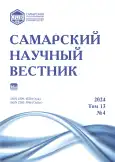The Macedonian question in Greek foreign policy in the 19th – early 20th century
- Authors: Skvoznikov A.N.1
-
Affiliations:
- Samara State University of Economics
- Issue: Vol 13, No 4 (2024)
- Pages: 67-72
- Section: Historical Sciences
- URL: https://journal-vniispk.ru/2309-4370/article/view/284631
- DOI: https://doi.org/10.55355/snv2024134204
- ID: 284631
Cite item
Full Text
Abstract
The article examines the process of formation of the foreign policy doctrine of Greece in Southeastern Europe in the 19th century after the creation of the independent Greek state. The author identifies the causes, forms and methods of the struggle of the newly formed Balkan states (Greece, Bulgaria and Serbia) for the predominance of the weakening Ottoman Empire in the European provinces, in particular, in Macedonia. The author concludes that, having gained independence, the young Greek state sought to occupy its geopolitical niche and establish itself as an influential regional power in the Balkans. As a result, the Greek national elite is trying to find the optimal foreign policy strategy for the Greek Kingdom. The most daring project to recreate the Byzantine Empire by the Greek people turned out to be an illusion, a mirage, and it was initially doomed to failure. Since solving such an ambitious geopolitical task required significant military, human and economic resources, as well as serious diplomatic support from the great powers, which the small Greek kingdom did not fully possess. The main foreign policy task of Greece in the second half of the 19th – early 20th century was the gradual reunification of the Greek people, divided for historical reasons, within the framework of a single national state. The implementation of this task encountered a counter movement of other Balkan peoples (Bulgarians, Serbs, Turks), who also sought to expand or preserve the state territory.
Full Text
##article.viewOnOriginalSite##About the authors
Alexander Nikolaevich Skvoznikov
Samara State University of Economics
Author for correspondence.
Email: skvoznikov2003@mail.ru
candidate of historical sciences, associate professor of Philosophy and History Department
Russian FederationReferences
- Соколовская О.В. Греция: конец «эпохи романтизма» // История Балкан. На переломе эпох (1878–1914 гг.) / отв. ред. К.В. Никифоров. М.: Институт славяноведения РАН, 2017. С. 157–178.
- Никитина Т.В. Греция в международных договорах XIX – начала XX вв. (формирование государства) // Исторические исследования. Журнал Исторического факультета МГУ имени М.В. Ломоносова. 2020. № 15. С. 144–152.
- Константинова Ю.Т. Славянские и антиславянские идеи болгар и греков (середина XIX – начало XX вв.) // Славяне и Россия. Россия: взгляд на Балканы. XVIII–XXI вв. К 100-летию со дня рождения И.С. Достян: колл. монография / отв. ред. С.И. Данченко. М.: Институт славяноведения РАН, 2021. С. 315–326. doi: 10.31168/2618-8570.2021.10.
- Соколовская О.В. Сто лет борьбы Греции за расширение территории (1820–1920 гг.) // Славяне и Россия: Россия, Болгария, Балканы. Проблемы войны и мира. XVIII–XXI вв. (Мифы и реальность): сб. ст. / гл. ред. К.В. Никифоров. М.: Институт славяноведения РАН, 2019. С. 290–309. doi: 10.31168/2618-8570.2019.12.
- Квашнин Ю.Д. Македонский вопрос в современной греческой политике // Мировая экономика и международные отношения. 2019. Т. 63, № 2. С. 66–74. doi: 10.20542/0131-2227-2019-63-2-66-74.
- Сквозников А.Н. Македонский вопрос во внешней политике балканских государств (Болгарии, Греции, Сербии и Румынии) в конце XIX – начале XX века // Известия Самарского научного центра Российской академии наук. Исторические науки. 2023. Т. 5, № 3 (19). С. 82–99. doi: 10.37313/2658-4816-2023-5-3-82-99.
- Едемский А.Б., Каресев А.В., Цехмистренко С.П. К истории македонского вопроса // Славяноведение. 1993. № 1. С. 66–81.
- Теплов В.А. Греко-болгарский церковный вопрос по неизданным источникам. СПб.: Тип. В.С. Балашева, 1889. 245 с.
- Цехмистренко С.П. Греция, Россия и Восточный кризис 1875–1878 гг. Страницы истории: монография. М., 2013. 224 с.
- Субаев Р.Р. Идеология греческого национального движения в младотурецкой революции: ирредентизм и имперско-федералистский эллинизм // Славянский альманах. 2016. № 3–4. С. 120–137.
- Stavrianos L.S. The Balkans 1815–1914. New York: Holt, Rinehart and Winston, 1963. 135 p.
- Dakin D. The Greek struggle in Macedonia. 1897–1913. Thessaloniki: Institute for Balkan Studies, 1966. 538 p.
- Архив внешней политики Российской империи (АВПРИ). Ф. 319. Гражданское агентство в Македонии. Оп. 631. 1907. Д. 15.
- АВПРИ. Ф. 151. Политархив. Оп. 482. 1904/1905. Д. 3386.
- АВПРИ. Ф. 151. Политархив. Оп. 482. 1904. Д. 2648.
- АВПРИ. Ф. 165. Миссия в Афинах. Оп. 507. 1905. Д. 1369.
- Соколовская О.В. Греция в системе международных отношений 1897–1913 гг. и российская дипломатия // В «пороховом погребе Европы». 1878–1914 гг. М.: Индрик, 2003. С. 453–475.
- Гуринова О.Н. Македонский вопрос в международных отношениях 1913–1920 гг.: монография. Харьков: ХНУ имени В.Н. Каразина, 2015. 304 с.
- Петрунина О.Е. Национальная идея в формировании греческого государства в конце XVIII – начале XX вв.: автореф. дис. … д-ра ист. наук. М., 2012. 38 с.
Supplementary files






